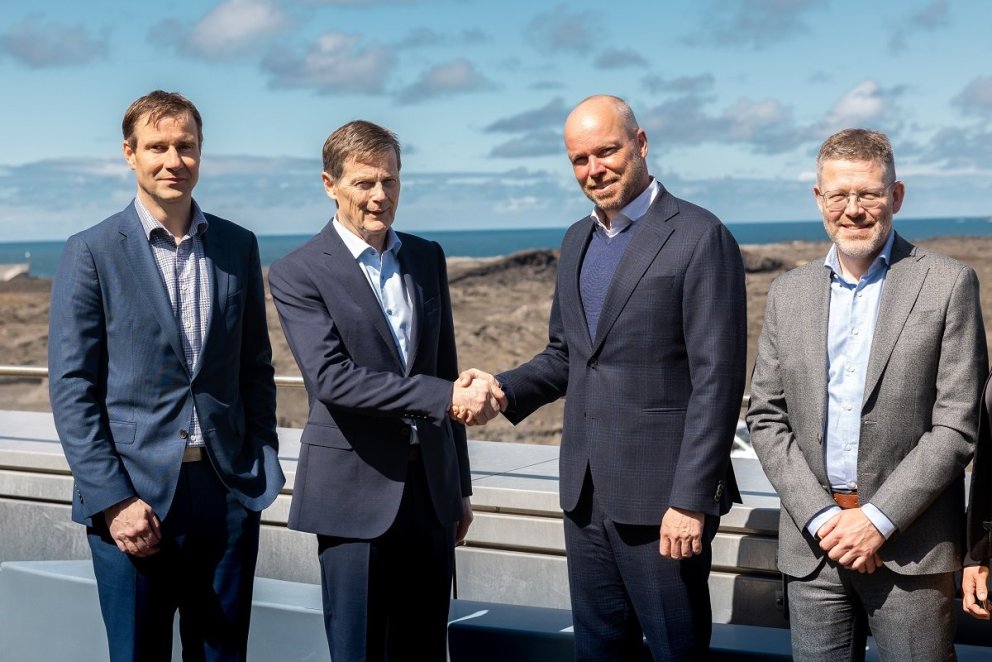Samherji signs major RAS deal

A £263m deal to build Iceland’s largest land-based salmon plant was announced last night. It will be located on the coast at Reyjanes, just a few miles south of the capital, Reykjavik and will use the power of Iceland’s hot springs.
Samherji, the country’s main integrated fishing company announced it had entered into agreement with HS Orka, a leading independent power generator, to develop RAS salmon farming on the Resource Park, next to the Reykjanes geothermal power plant.
Samherji Fiskeldi, the group’s aquaculture arm, said the goal is “to produce a wholesome quality product with a low ecological footprint”.
The site will have the capacity to harvest up to 40,000 tonnes of salmon in three stages over the next 11 years. That figure is 6,000 tonnes more salmon than the entire country produced last year (34,000 tonnes)
Samherji said the farm would use warm seawater from the cooling of the Reykjanes Power Plant. Samherji fiskeldi, a company within the Samherji group, has also reached an agreement with landowners for the development.
The project will consist of a hatchery, an ongrowing farm, a processing house, and service buildings.
The total investment is estimated at over ISK 45 billion (£263m). The board of Samherji says it has decided to provide funding for the first phase of the project, but it is planned to seek funding from investors for further expansion of the facilities.
The fish farming plans in the Resource Park are considered significant compared to other aquaculture projects currently being prepared in Iceland and internationally.
Work on the assessment process, licensing and design has begun and construction is scheduled to be completed next year.
According to Samherji’s plans, juvenile production will start in the first phase in early 2023 and continued farming and processing of products in 2024 and 2025.
In the first phase, 10,000 tonnes of salmon will be produced, with an estimated investment of ISK 17 billion. In the second phase, 10,000 tonnes will be added, and in the third phase, 20,000 tonnes. If everything goes according to plan, the land-based farming in the Resource Park will be at full capacity in the year 2032.
Samherji fiskeldi already has some activity in the Southern Peninsula region as the company operates a processing plant in Sandgerdi, a farm in Stadur by Grindavík and a farm in Vatnsleysuströnd. In addition, the company has a salmon farm in Núpsmýri by Kópasker and a hatchery at Núpar in Ölfus.
HS Orka currently operates two geothermal power plants in Svartsengi and Reykjanes and one hydropower plant at Brú in Tungufljót in Biskupstungur. In the Resource Park around HS Orka’s geothermal power plants, a unique community of companies now uses resource streams from the power plants in their operations
Thorsteinn Már Baldvinsson, CEO of Samherji, said: “The development of land-based salmon farming within the Resource Park is the result of the utilisation of Samherji fiskeldi’s and HS Orka’s knowledge in very different areas.
“When combined, we consider it efficient to develop extensive land-based fish farming, which surely must be considered important news. These investments will also create dozens of jobs in Reykjanesbær and the Southern Peninsula region and significantly increase Iceland’s export revenues.
He added: “The board of directors of Samherji has already agreed to contribute ISK 7.5 billion to this aquaculture project to ensure the development of the first phase.
“In my opinion, it shows the confidence we have that this is the right path to the future of food production and value creation. At a later stage, we will look for more investors to ensure the complete structure of the project.”
Tómas Már Sigurdsson, CEO of HS Orka, said: “We welcome Samherji’s plans for the Reykjanes Power Plant industrial site with the aim of producing a wholesome, quality product with a low ecological footprint.
The Resource Park’s ideology is precisely to promote better resource utilisation. In this project, seawater from the Reykjanes Power Plant will be used to ensure a constant ideal temperature for fish farming.”

Þorsteinn Már Baldvinsson (left) , CEO of Samherji and Tómas Már Sigurðsson, CEO of HS Orka, hand over the collaboration. They are accompanied by Jón Kjartan Jónsson, Managing Director of Samherji Fiskeldi, and Jón Ásgeirsson, Managing Director of HS Orka’s Strategy and Resource Park.

